Within the framework of the project "Curriculum Development in Agroecology" (CDAE) under the Eramus+ program funded by the European Union, on October 6, 2023, Vietnam National University of Agriculture (VNUA) organized a Roundtable Workshop on Curriculum Development in Agroecology – Master Program. Participating in the workshop, there were Prof. Dr. Pham Van Cuong, VNUA’s Vice President; Assoc. Prof. Dr. Tran Trong Phuong, Dean of the Faculty of Natural Resources and Environment; Assoc. Prof. Dr. Nguyen Thi Bich Thuy, Coordinator of the project; and leaders of the Faculty of Natural Resources and Environment, VNUA, members of the project’s Executive Board and Professional Committee, and representatives of a number of functional departments/offices of VNUA, institutes/research centers inside and outside VNUA, lecturers and students of the Faculty of Natural Resources and Environment, VNUA. In addition, the workshop also had the participation of leaders of a number of businesses such as Global Environment and Development Company Limited (GLENCO), and Phuong Bac Company, etc. The Roundtable Workshop on Curriculum Development in Agroecology – Master Program was organized with the goal of consulting relevant parties to complete the training program and continue to submit it to the Ministry of Education and Training for approval for official implementation in the near future.
Phát biểu tại Hội thảo, GS.TS. Phạm Văn Cường, Phó Giám đốc Học viện nhấn mạnh vai trò quan trọng của Dự án CDAE trong việc hỗ trợ các trường châu Á thành viên dự án trong việc xây dựng khung chương trình đào tạo thạc sỹ sinh thái nông nghiệp trên cơ sở kinh nghiệm đào tạo của các trường thành viên châu Âu, nâng cao năng lực cho cán bộ giảng viên, cán bộ quản lý, cán bộ hành chính và hỗ trợ một số thiết bị cần thiết phục vụ chương trình đào tạo. Dự án đã góp phần nâng cao và đảm bảo chất lượng cho chương trình đào tạo của Khoa TN&MT cũng như của Học viện.
Speaking at the Conference, Prof.Dr. Pham Van Cuong, VNUA’s Vice President, emphasized the important role of the CDAE Project in supporting project member Asian universities in building a framework for master's training programs in Agroecology based on training experience of European member universities, improving the capacity of lecturers, managers, and administrative staff, and supporting some necessary equipment for the training programs. The project contributed to improving and ensuring the quality of the training program of the Faculty of Natural Resources and Environment as well as VNUA.
    |
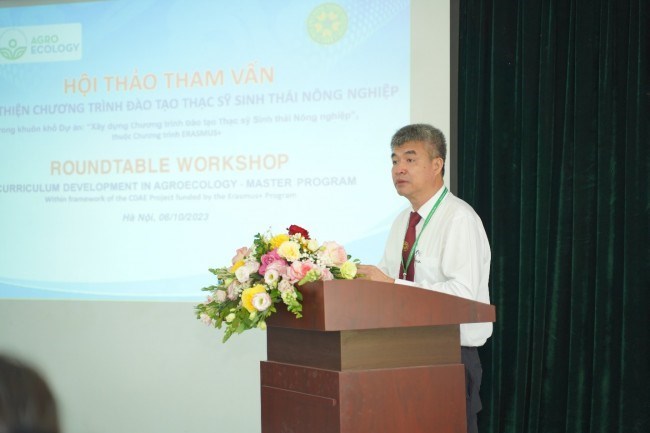 |
| Prof. Dr. Pham Van Cuong, VNUA’s Vice President, delivers a speech at the Workshop |
Assoc. Prof. Dr. Tran Trong Phuong, Dean of the Faculty of Natural Resources and Environment, said that the Agroecology master's training program was associated with the faculty's policies and development orientation, ensuring the training of human resources with good knowledge and skills, and further matching the training program with practical needs. Although the project had been affected by the Covid-19 epidemic, with the support and facilitation from VNUA’s President Board, functional departments and offices, the project’s Executive Board and Professional Board along with the efforts of leaders and lecturers at the Faculty of Natural Resources and Environment, VNUA completed the program and submitted it to the Ministry of Education and Training for approval to open the program. To keep up with the project schedule, VNUA and a number of member universities conducted pilot teaching of a number of subjects in the program. On that basis, feedbacks were gained from students as well as consultation from relevant parties was to be carried out to complete the program and submit it to the Ministry for approval in the 2024-2025 school year.
At the workshop, a number of presentations were given. Representing the Project Coordination Board, Assoc. Prof. Dr. Nguyen Thi Bich Thuy briefly introduced the project's history, implementation process and results achieved during the project's implementation. Assoc. Prof. Dr. Nguyen Thanh Lam, lecturer of the Faculty of Natural Resources and Environment, presented the process of building the Master of Agroecology training program at member universities in the Philippines, Sri Lanka and Vietnam. Assoc. Prof. Dr. Vo Huu Cong, Vice Dean of the Faculty of Natural Resources and Environment, presented details of the training program, career opportunities and admission requirements.
    |
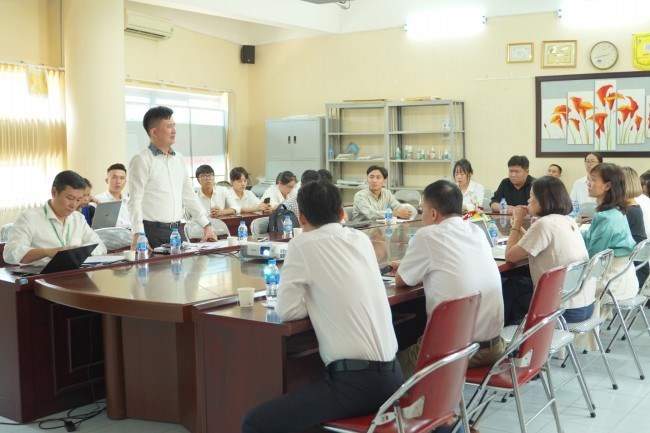 |
| Assoc. Prof. Dr. Tran Trong Phuong, Dean of the Faculty of Natural Resources and Environment, delivers a speech at the Workshop |
    |
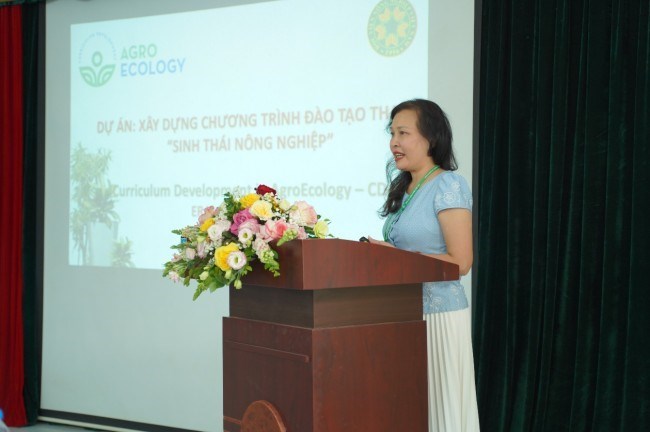 |
| Assoc. Prof. Dr. Nguyen Thi Bich Thuy, Project Coordinator, introduces the project |
    |
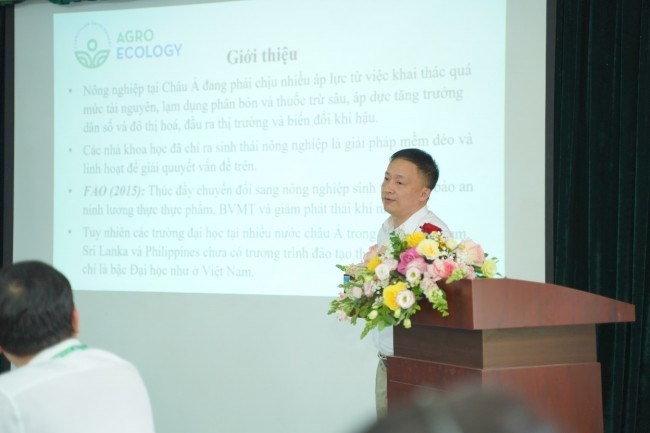 |
| Assoc. Prof. Dr. Nguyen Thanh Lam, lecturer of the Faculty of Natural Resources and Environment, presents the development process of Master’s training programs in Agroecology at project member universities. |
    |
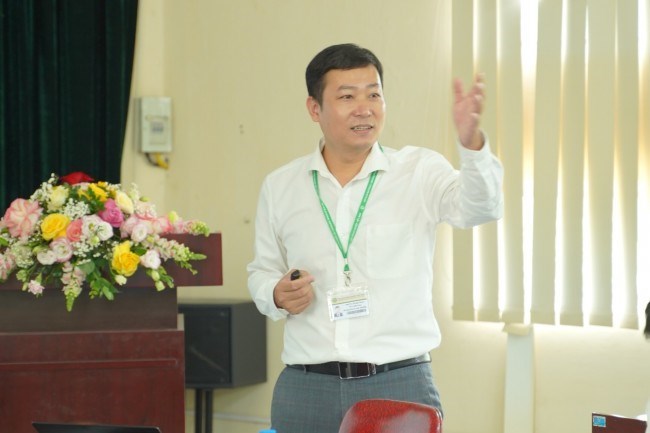 |
| Assoc. Prof. Dr. Vo Huu Cong, Vice Dean of the Faculty of Natural Resources and Environment, VNUA, introduces the training program, career opportunities and admission requirements |
During the discussion session, delegates expressed a consensus on the urgency and need to develop ecological agriculture as well as the prospects of the training industry of Agroecology. To make sure that the program met practical requirements, the training program needed to create a change in thinking about ecological agriculture, increase practice hours, and integrate the development of urban agriculture with the development of biological agriculture. Therefore, there needed to be more attention and support from the Ministry of Education and Training, a change in awareness of the teaching staff, and especially the strengthening of the communication about the training program to localities.
    |
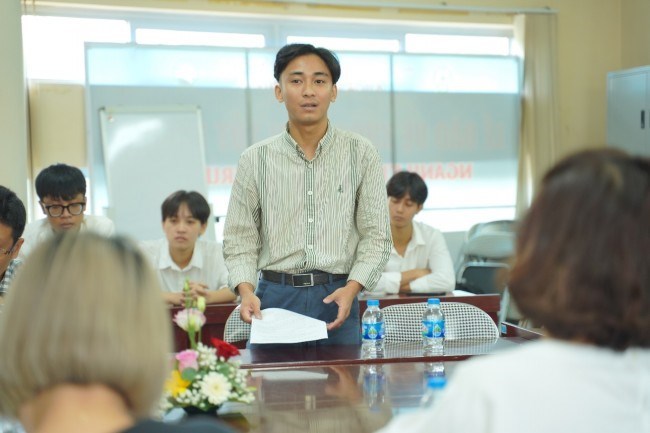 |
| Mr. Tran Dang Anh, Business Representative, shares his opinion |
    |
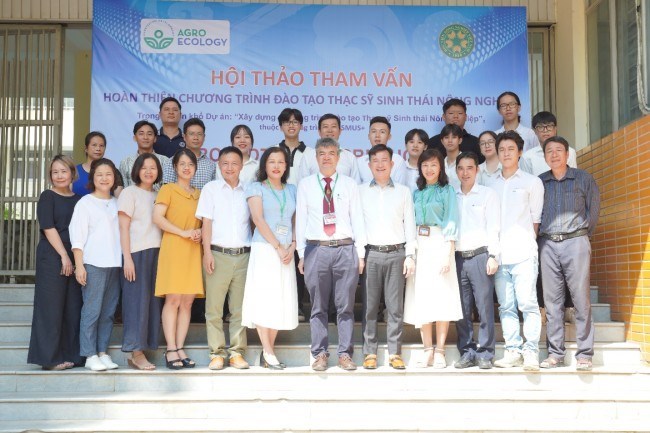 |
| Delegates attending the Workshop |
The workshop ended successfully with the widespread sharing of project results as well as valuable comments from the delegates. Hopefully, the Agroecology Master’s training program would soon be completed and approved for implementation, helping to meet social needs and contributing to the development of sustainable agricultural and food systems, to conserve biodiversity and natural resources, to minimize the impact of climate change, and to improve health and nutrition.